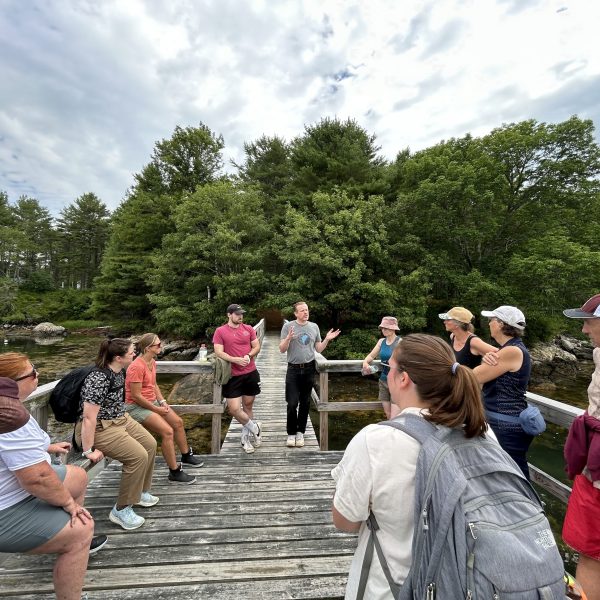Our Mission
To advance the research and practice of teaching and learning in science, technology, engineering, and mathematics, the STEM disciplines.

The Maine Center for Research in STEM Education (RiSE Center) is an interdisciplinary center organized to conduct research, graduate education, and professional development, and to build community partnerships focused on improving the research and research-based practice of STEM education at all levels of instruction. Members of the RiSE Center include faculty, staff, and graduate students engaged in education research across multiple STEM departments and the College of Education at the University of Maine.
RiSE faculty, staff, students, and collaborators contribute to knowledge of teaching and learning across STEM subject areas, with significant national and international contributions in Biology, Chemistry, Earth Sciences, Education, Marine Sciences, Mathematics, and Physics.
The RiSE Center provides education and professional development for emerging educators through undergraduate and graduate opportunities, including teaching and research assistantships, a Master of Science in Teaching degree with a teacher certification option, and an interdisciplinary STEM Education PhD program.
The RiSE Center also facilitates community partnerships with K–12 schools and school districts, teachers, university faculty, and other organizational partners in Maine and beyond to improve STEM education and teacher preparation through research-supported practices.
History of the RiSE Center
The Maine Center for Research in STEM Education (RiSE Center) was founded in 2001 (originally with the name Center for Science and Mathematics Education Research) with a $1.23 million grant from the U.S. Department of Education Fund for the Improvement of Education. This initial grant began the development of the RiSE research portfolio, using discipline-based education research to study teaching and learning. It also established the Master of Science in Teaching Program, a content-rich, research-based program for secondary teacher preparation or further graduate study for those interested in STEM education research.
Faculty who were part of the team to launch the Center, develop and teach the core courses, and form partnerships during Center’s first decade are: François Amar (Chemistry), Mitchell Bruce (Chemistry), Robert Franzosa (Mathematics and Statistics), Chris Gerbi (Earth and Climate Sciences), Susan McKay (Physics and Astronomy, Founding Director Emerata), Eric Pandiscio (Learning and Teaching), Molly Schauffler (Earth and Climate Sciences), Natasha Speer (Mathematics and Statistics), John Thompson (Physics and Astronomy), Michael Wittmann (Physics and Astronomy), and Professor Emeritus Steve Norton (Earth and Climate Sciences). This team provided the foundation for the success of RiSE and its growth to its current 16 faculty members, over 100 Master of Science in Teaching graduates, and 8 professional staff. RiSE faculty members come from four of UMaine’s colleges: Education and Human Development, Engineering, Liberal Arts and Sciences, and Earth, Life, and Health. Thus, RiSE brings together multiple disciplinary perspectives in its research, which often includes the ongoing involvement and contributions of teachers and administrators as well.
The RiSE research portfolio now contains a broad spectrum of basic and applied research and evaluation studies, such as investigations of knowledge for teaching, reasoning chains in student development, creation of more authentic laboratory learning experiences, using virtual reality to support learning, quantitative reasoning in context and data literacy, emotional aspects of science teaching and learning, incorporating ethics and justice in STEM communication courses, student knowledge transfer across courses and disciplines, and teacher supports needed to integrate STEM disciplines and conduct comunity-based, project based learning.
In its second decade, RiSE received a major NSF Math Science Partnership grant, closely followed by a Maine Department of Education grant. These awards combined brought in over $15 million to build partnerships to improve science education at the elementary, middle and 9th grade levels, with particular attention to physical sciences across the critical junction between middle and high school and the recruitment and preparation of STEM teachers. This work involved over 1,100 Maine teachers and has sustained since the grants ended through the formation of the Maine STEM Partnership at the RiSE Center, a statewide STEM education improvement community. Current RiSE programs initiated through these grants include the Faculty Course Modification Incentive Grant-Maine Learning Assistants Program (FIG-MLA), the RiSE Materials Warehouse, and professional learning communities for teachers using RiSE task-force selected instructional resources, and RiSE teacher collaboratives. These expanded state-wide programs would not have been possible without the talents and commitment of RiSE staff members, many of whom bring valuable teaching experience and knowledge of STEM education research to their work.
RiSE continues to expand its research portfolio and build research-practice partnerships with teachers, STEM and STEM education faculty, community members and other stakeholders to strengthen STEM education for all Maine students. Examples of research-practice partnerships include the NSF Teaching Fellowship Program, which recruits, prepares, supports and retains STEM teachers in high-need Maine districts; the NSF STEM+C Program, which integrates computing and computational thinking into middle school science; an NSF EPSCoR Track-1 and Track-2 partnerships, which bring cutting-edge, environmentally relevant research into Maine classrooms, and the NSF ITEST partnership that supports middle school and high school students in authentic science research experiences, including coastal monitoring and investigations of local changes in ocean water properties . This work brings the excitement and opportunities offered by a high quality STEM education to over 9,000 students annually, PreK–16+, while building a culture of evidence to guide ongoing improvement.

